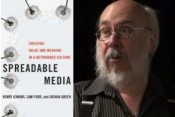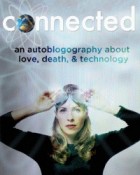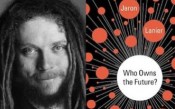TIFFANY SHLAIN – 24/6: The Power of Unplugging One Day a Week
Written on September 19th, 2019In this episode, Terrence welcomes Emmy-nominated filmmaker, speaker and Webby Awards Founder Tiffany Shlain to the podcast. Terrence and Tiffany discuss her career path, the societal impact of technology, and the inspiration for her book, 24/6: The Power of Unplugging One Day a Week. They share their thoughts on how the digital age has impacted not just the way we live our lives, but how we think, feel and communicate with one another. Tiffany expounds on her family’s decade-long transformative practice of turning off screens one day each week for what she calls her Technology Shabbat. Finally, Terrence and Tiffany explore what the future could look like for our world if we act swiftly and resist the addiction that technology has inflicted on us as a people.
Continue reading “TIFFANY SHLAIN — 24/6: The Power of Unplugging One Day a Week”
Free Forum – JAMIE BARTLETT Author, RADICALS CHASING UTOPIA: Inside the Rogue Movements Trying to Change the World
Written on July 1st, 2017JAMIE BARTLETT, a Director of the Centre for the Analysis of Social Media for Demos in the UK, is the author with William Heinemann in 2014 of THE DARK NET about hidden internet subcultures. His newest book, just out, is RADICALS CHASING UTOPIA: Inside the Rogue Movements Trying to Change the World. We’ll also talk a lot about a recent column he wrote in the Guardian, Forget far-right populism – crypto-anarchists are the new masters.
https://www.demos.co.uk/people/jamie-bartlett/
Q&A w/ HENRY JENKINS, SPREADABLE MEDIA – Creating Value and Meaning in a Networked Culture
Written on September 12th, 2014 |
Aired: 04/21/13
“If it doesn’t spread, it’s dead,” is the simple consistent message of a new book, SPREADABLE MEDIA: Creating Value and Meaning in a Networked Culture, that maps the changes taking place in our media environment. For all their consolidation, concentration, and money, corporations can no longer control media distribution. Millions are now directly involved in the creation and circulation of content.
“Stickiness” – focusing attention in centralized places — has been the measure of success in the broadcast era. No more. “Spreadability” – dispersing content through formal and informal networks, with and without permission – is the new goal.
What does this mean for media? For information? For culture? For the distribution of power? And how can you take advantage of the new realities to have greater impact and influence?
I’ll be talking about all of that this week with one of the book’s authors, HENRY JENKINS. He coined the term “participatory culture” and he’s been paying attention for decades to the crowd on the other side of the camera, the microphone, and the screen.
www.henryjenkins.org
www.spreadablemedia.org
Q&A: TIFFANY SHLAIN-director, CONNECTED: A DECLARATION OF INTERDEPENDENCE
Written on August 27th, 2014 |
In CONNECTED, as her father battles brain cancer and she confronts a high-risk pregnancy, TIFFANY SHLAIN, co-founder of the International Academy of Digital Arts & Sciences and a Fellow at the Aspen Institute, asks what it means to be connected in the 21st century.
The documentary film continues at three theaters in the Bay area, opens 09/30 at the Arclight Hollywood (Q&A w Shlain)and at the Angelika in New York 10/14 (Q&A w Shlain).
TIFFANY SHLAIN, honored by Newsweek as one of the “Women Shaping the 21st Century,” is a filmmaker, artist, founder of The Webby Awards, co-founder of the International Academy of Digital Arts & Sciences and a Henry Crown Fellow of The Aspen Institute. Her films include Life, Liberty & The Pursuit of Happiness, about reproductive rights in America and The Tribe, an exploration of American Jewish identity through the history of the Barbie doll, Yelp: With Apologies to Allen Ginsberg’s Howl, about our addiction to technology and the importance of “unplugging”, and her newest Connected: A Declaration of Interdependence
http://www.tiffanyshlain.com/tiffanyshlain/Home.html
http://connectedthefilm.com/
Free Forum Q&A: JARON LANIER, Author of WHO OWNS THE FUTURE?
Written on November 26th, 2013 |
Aired: 11/24/13
After its recent IPO, Twitter is valued at nearly $25Billion. Now what is Twitter? Millions of tweets created and shared by users plus some ads. But how many users get a piece of that $25Billion? Well, none.
Where would Facebook be without Friends? What would Twitter, Amazon, Yelp, and any network whose value is based on our data, be without us – sharing photos and feelings, making purchases, registering opinions. More than programming or advertising, TV has always been about selling our eyeballs. Likewise, today’s online giants are selling our visits, our clicks, our shares.
JARON LANIER, in his new book, WHO OWNS THE FUTURE?, writes: “At the height of its power, Kodak employed more than 140,000 people and was worth $28 billion. They even invented the first digital camera. Today Kodak is bankrupt, and the new face of digital photography is Instagram. When Instagram was sold to Facebook for a billion dollars in 2012, it employed only 13 people. Where did all those jobs disappear? And what happened to the wealth that all those middle-class jobs created?”
He believes the emerging business model in which companies with relatively few employees profit off the participation of all of us, could doom any hope of a rebirth of the middle class. Lanier wants to solve a problem not many are talking about, and he envisions a radical solution — “a highly humanistic economy – one that will reward people for the valuable information they share with networks and the companies that control and profit from them.
